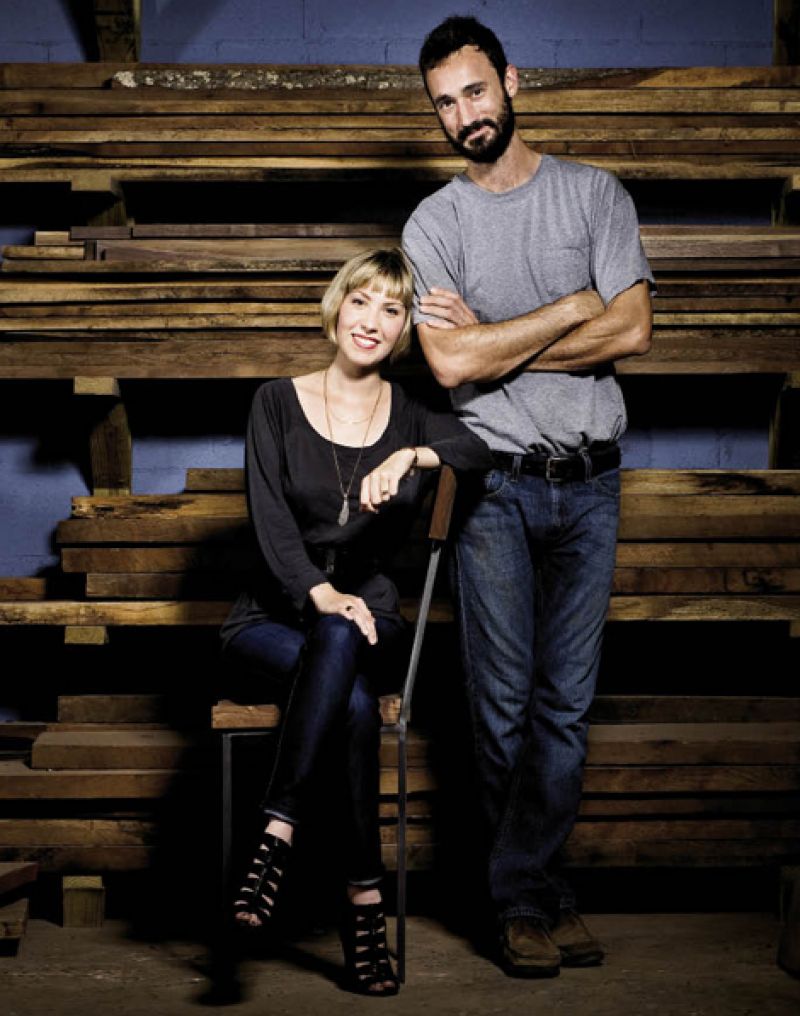
Michael James Moran is fluent in wood. In his Meeting Street Road workshop, the Kentucky-born craftsman speaks black walnut, Himalayan cedar, and red elm—not to mention maple, cypress, sycamore, and more—translating the unique natural grain of each milled board into custom furniture pieces. Whether a hand-carved bench of curly white oak in a Mount Pleasant hallway or a walnut dining table headed to a family in Baltimore, each tells a story that Moran and Celia Gibson, his business partner and fiancée, honor and preserve, from the acquisition of storm-felled trees and sustainably milled planks to the several coats of tung oil finish.
Theirs is an organic and intuitive process, highly influenced by traditional Japanese furniture making—working “with” the material, rather than “at” it—to create modern, natural, and functional art. It starts with air-drying and curing the wood in a solar-powered kiln. The wood is then catalogued and stored until the perfect project comes along. “When you come across raw material, you hold on to it,” says Moran. “You wait to see what it will become.”
For a low-slung credenza crafted for their office, Moran selected a curved piece of butternut from a small mill in Pennsylvania. “I framed it with black walnut to showcase the beauty, color, and movement of the wood,” he explains. Moran’s overall goal, he says, is to balance three key elements: the beauty of the materials, the integrity of the design, and the quality of construction. “You create a table or a chair to make something beautiful and lasting,” he says. “It’s about paying attention to every step of the process and being responsible.”
Moran grew up around that sense of responsibility and craftsmanship. His father is a carpenter-turned-psychiatrist-turned-poet/gardener, who built most of the family’s furniture. When a 10-year-old Moran wanted a skateboard, his mother said he had to build it. So, he fashioned one out of wood. “I’d always made things,” says Moran. “The more I did it, the more it made sense.”
Moran moved to the Lowcountry in 1999 to play soccer at the College of Charleston and study anthropology. But it was his continuing self-education in woodworking—reading the writings of renowned furniture designer George Nakashima, among others—as well as an informal two-year apprenticeship under local furniture-maker Kirk Heidenrich that taught him the trade, enhanced his skills, and deepened his desire to build.
With the confidence of interior designer George Misoyianis, and consequently Moran’s first commission, the woodworker struck out on his own and has been creating his one-of-a-kind tables, chairs, cabinets, and bookcases ever since. Gibson joined the company as a partner 10 months ago fresh from a Masters program at University College London and—in addition to marketing, managing, designing, and meeting with clients—is learning some of the hands-on trade. “Celia has excellent ideas when it comes to design and a discriminating eye for the finish work,” says Moran.
Crafted mostly on commission, their pieces enhance homes here in Charleston and around the country. And Moran and Gibson stay invested in every step, right up to placing the last chair at the table themselves. “Good furniture is something you have for a lifetime, or longer,” he says. “We hope to enrich our clients’ lives with the time, energy, and care that goes into every piece.” Whatever they create, you can be sure it will have a story, and that it will begin and end with wood.